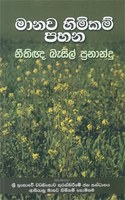 Printed by Ravaya Publishers and distributed at all bookshops. It consists of 151 pages consisting of 17 chapters and a further chapter explaining the reasons for writing this book. The cover page reproduces a picture taken at Baranas (Varanasi) of mustard plant flowers. Its symbolism to Sri Lankan culture is explained in the chapter entitled ‘I saw mustard flowers at Baranas’.
Printed by Ravaya Publishers and distributed at all bookshops. It consists of 151 pages consisting of 17 chapters and a further chapter explaining the reasons for writing this book. The cover page reproduces a picture taken at Baranas (Varanasi) of mustard plant flowers. Its symbolism to Sri Lankan culture is explained in the chapter entitled ‘I saw mustard flowers at Baranas’.
The chapters are: Failed independence and caste system in Sri Lanka (This deals with the history of universal suffrage introduced to Sri Lanka in 1931 and how the influence of the caste system undermined the possibilities of the development of a democratic system). Four stages of Buddhism in India (how the rise, fall and resurrection of caste in India impacted on Sri Lankan culture). Bullshit and absurd talk (the ideas of Prof. Harry G. Frankfurt of Princeton University in his book ‘Bullshit’ is explained in terms of Sri Lankan culture and the impact on democracy and human rights). The gradual ending of a dream born in the early part of the 19th century (this deals with the aspirations and expectations of the Sri Lankan elite to better their future through close collaboration with the British who started their rule over the whole country in 1815 and how the end of this dream has taken place in post independent Sri Lanka. The inability of the elite to understand the end of their dream and their refusal to readjust to the new forces alive in the country is shown as a major cause leading to the rise of various conflicts). Two absurd characters that held the post of president in Sri Lanka (this deals with J.R. Jayawardene and Chandrika Kumaratunge whose absurd styles of the ruling has caused the Sri Lankan state to be what it is now). How the possibilities of the development of democracy were distorted and a period of banditry was developed (How the positive democratic avenues that were abandoned in favour of corrupt regimes is discussed). Brahmins that confused the minds of the Sinhalese (This deals with the adverse influence of Brahmanism on Sri Lankan culture). Some aspects of the behaviour and habits of the Sinhalese critiqued by a Sinhalese. (This is a cultural critique from within the same racial group). How Sri Lankan society degenerated to this extent. (This issue is discussed on the basis of some cultural texts). In the past it was the sluice gate and now it is mass graves (the pride of Sri Lankan civilization is its early irrigational development based on the achievements of engineering relating to the use of sluice gates to provide water for irrigation. The loss of this creativity and the negative developments which have made mass graves a common experience is discussed). From a strong control to criminalization of politics leading to the collapse of political control (how the political ideology which emerged in the early 70’s for strong rule, meaning some limitations on democracy lead to the complete criminalization of politics and the collapse of political control altogether). The promotion of virtues and the promotion of norms and standards (this contrasts the usual religious and societal propaganda about improving values as against the refusal to improve norms and standards). The need of mass movements not affiliated to political parties speaking in a loud voice to end conservatism (This chapter discusses the dangers of human rights movements being too closely affiliated to political parties and provides a strong argument for independent civil society movements). Will the sun rise to Veyangoda (the conflict between feudal values and democracy is discussed). Making war which should be discarded into an accepted ideal (the propaganda on all sides which tries to transform conflict into armed conflict treating war as an ideal is discussed with references to post World War 2 antiwar movement concepts). Cruelty and criminality that the Sri Lankan intellectuals have not managed to exclude (the roots of caste consciousness remaining in the intellectual traditions in Sri Lanka is discussed). I saw mustard flowers at Baranas (is a discussion on original Buddhist values based on the famous Buddhist story of the mustard seed).
Language: Sinhalese; ISBN: 978-955-1468-06-4
For orders and enquiries: Email ahrc@ahrc.asia or call +(852) 2698 6339 +(852) 2698 6339.
* This book is temporarily out of stock.*